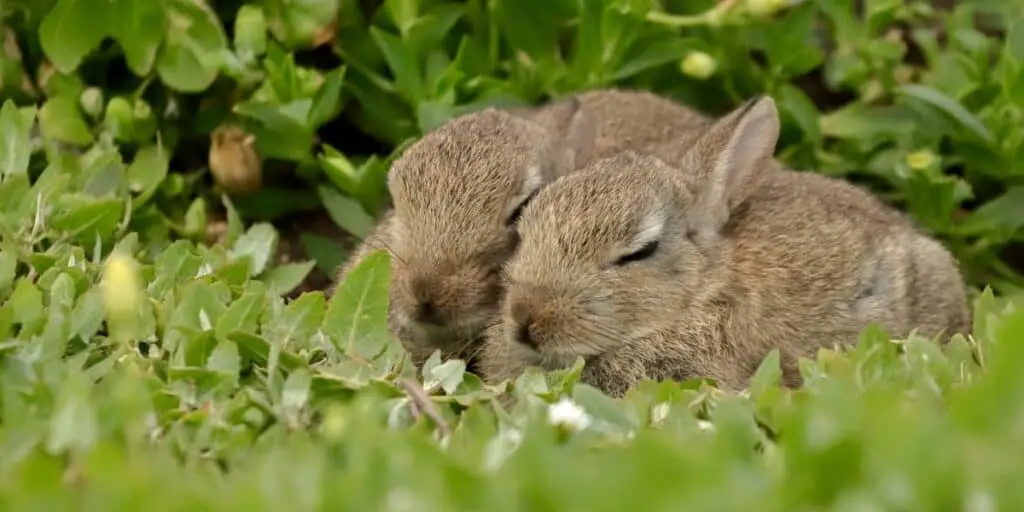If you’re peeking into the hutch (again) and want to be absolutely sure that your bunny is sleeping check for these 5 key signs that a rabbit is sleeping:
- Your rabbit will be well and truly sprawled out. When your rabbit feels safe and secure they can unwind and let everything go! These sleeping rabbits will be on their stomachs and fully stretched out. When you see a rabbit snoozing like this, you shouldn’t disturb them.
- The bunny may be curled into a furry ball. In cooler weather bunnies will enjoy curling up to conserve body heat while they sleep.
- Some rabbits will lie on one side. Rabbits that sleep like this may appear to be dead, but this is another sign of real relaxation and authentic sleep.
- Eyes may be open! Bizarrely, some rabbits will have one or both eyes open to monitor potential predators as they rest. Rabbits possess a nictitating membrane, a translucent third eyelid that allows visual stimuli while covering and protecting the eye.
- Ears are at ease. Sleeping rabbits will have their ears down where they feel fully comfortable and content.
Table of Contents
Rabbits have the most intriguing sleeping habits
Sleep in rabbits is fascinating and being able to watch a cute and cuddly bunny relax and rest is a precious sight. As a prey species, rabbits exist in nature with the constant threat of predation.
This has a major impact on the development and behavior of rabbits, meaning that they find it hard to escape the constant watchfulness and wakefulness that is necessary for survival.
They are hardwired for flight and have high levels of arousal, meaning that they startle easily and do not easily relax. This means that quality sleep is vital for both pet and wild rabbits and you need to support their sleep as much as possible.
Rabbits are daytime sleepers
As crepuscular animals, who are most active at dusk and dawn, the daylight hours are ideally reserved for getting their much-needed rest. At a minimum rabbits require 8 hours of sleep daily and are capable of taking advantage of up to 12 hours if the conditions are right.

As a pet owner, you may find that you can only spend your quality time with your bunny in the early mornings and evenings as you should not wake them up in the day.
More on the rabbit sleep cycle
If you observe your rabbits sleep you will find that it takes place in multiple stages. This is all due to their high-level alertness and the time and stages needed for a bunny to fully unwind.
Sleep studies in rabbits have identified at least 6 distinct sleep states which explain the sometimes bizarre sleeping behaviors your rabbit might display.
- Drowsy: This initial pre-sleeping stage is where your rabbit starts to relax and lets its guard down. It’s really important to not disturb a rabbit that is drowsy and trying to get to sleep.
- Active sleep without Rapid Eye Movement (REM): This is where sleep is becoming established for the rabbit. Though your rabbit is sleeping, it still retains a certain level of alertness in case of predation.
- REM sleep: also known as paradoxical sleep, this stage is deep established sleep where your bunny may even be dreaming! The proportion of the sleep cycle that is made up of this type of active sleep increases as rabbits get older.
- Quiet sleep: This post-REM stage is less deep but still restorative. Your bunny may make a low grinding noise, like purring, that indicates deep relaxation.
- Q-state: Rabbits can appear agitated in this stage of sleep, but they are still resting. The rabbit’s breathing becomes rapid and shallow and the nose of the rabbit starts to vibrate. At this stage, the rabbit’s eyes may be open.
- Freeze stare: The rabbit’s eyes are wide open and it may even be upright, but it is still sleeping.
Why not give your rabbit a hand in getting some quality sleep?
Good quality sleep is essential for your rabbit’s well-being and there are lots of things that you can do to aid your rabbit in sleeping well.
- Tackle stressors. Like humans, rabbits will sleep well if they are warm, comfortable and have a full tummy. You want to reduce lighting and keep noise to a minimum, which may take some effort as they will sleep throughout the daytime.
- Provide a cozy nesting spot. You want your rabbit to feel safe and enclosed, so ensure that the hutch has an inner, sheltered chamber filled with clean bedding.
- The more the merrier. In the wild, rabbits live in groups and even a pet rabbit will feel safer and more relaxed if it has company of its own kind.
Rounding up
If your pet rabbit is displaying these key signs of sleep you are getting something right! A sleeping rabbit is a contented rabbit, who will appreciate your restraint in letting them rest.
Continue to support good sleep in your pet rabbit by keeping them as settled and relaxed as possible and enjoy your quality time with play, cuddles, and treats when they wake up.



